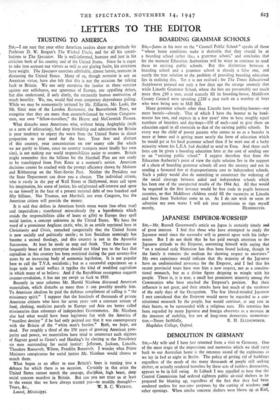DEMOLITION IN GERMANY
Sta,—My wife and I have just returned from a visit to Germany. One of the most tragic of the impressions and memories which we shall carry back to our Australian home is the ominous sound of the explosions as we lay in bed at night in Berlin. The policy of getting rid of buildings regardless of the needs of the many thousands of people still seeking shelter, or actually rendered homeless by these acts of ruthless destruction, appears to be in full swing. At Lfibeck I was appalled to hear that the Control Commission had ordered eighteen public air-raid shelters to be prepared for blowing up, regardless of the fact that they had been rendered useless for war-time purposes by the cutting of windows an4 other openings. When similar concrete shelters were blown up at Kiel,
though they were mainly in parts of the town already destroyed, considerable damage was caused to buildings outside these areas. The Lubeck shelters are in the most thickly populated parts of the town. Their destruction would mean the loss not only of the 16,700 square yards of living-room which they provide, but a similar loss of at least 65,000 square yards from the effect of the blast in adjacent areas. No account appears to be taken of the terrific housing problem, which becomes more and more insoluble as a stream of refugees from Eastern Germany con- tinues to pour into this old Hanseatic town. No less than 37,000 are already obliged to live in wretched camps ; it is not uncommon for thirty men, women and children to share a room, and there is even no wood available to put up partitions. Protests by the Churches as to the effects on morality pass unheeded.
Other deplorable consequences of the explosions would arise from the vast mass of debris bringing traffic and economic life to a halt, the more so as bridges would be broken down. An important hospital is also in the danger zone. Wore still—at least from the permanent and his- torical aspect--the twelfth-century cathedral and the thirteenth-century Marienkirche (one of the finest examples of Gothic brick architecture), both already badly dainaged and shaken, can hardly survive. Two other churches would share their fate. We ask ourselves with surprise: Can it really be with the consent of British democracy that official policy in this (and unfortunately in a number of other ways) rejects humane considera- tions and takes no account of the disastrous political consequences?— Yours, &c., E. J. BRYCE. Stanhope Court Hotel, Stanhope Gardens, S.W. 7.































 Previous page
Previous page